Given the global impact of the Covid-19 pandemic, it seems a crucial time to reflect, from the perspectives of those who have studied disasters and public health crises, on social science’s insights and its potential impact (positive and negative). In this introductory essay to the “Disaster Studies” theme of our “Covid-19 and the Social Sciences” series, Alexa Dietrich and Scott Gabriel Knowles highlight how disaster research can shed light on the mutual effects of social inequality and disaster over time. Conversely, this theme will both explore how research through a disaster-focused lens can help us understand and address the preconditions and consequences that make the pandemic so devastating, and what can usefully be learned from the responses of institutions and communities worldwide that have most effectively reduced its impact, or that may signal hope for society’s future.

















